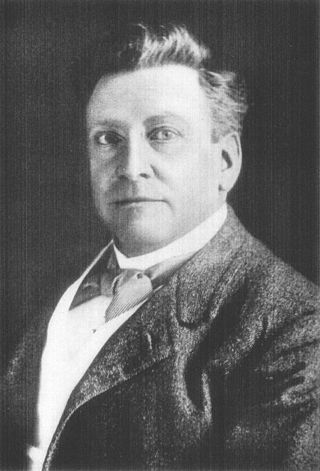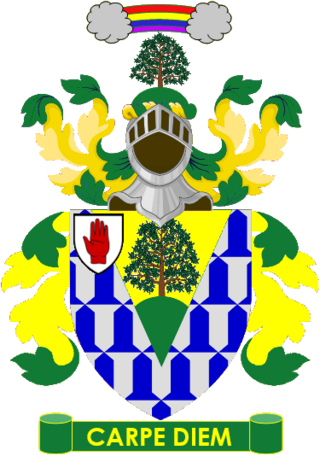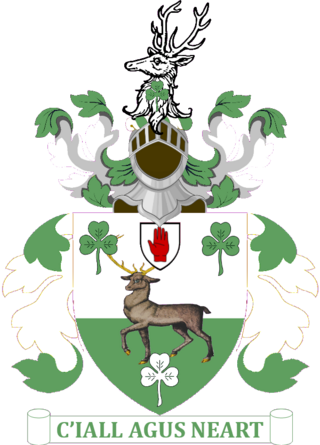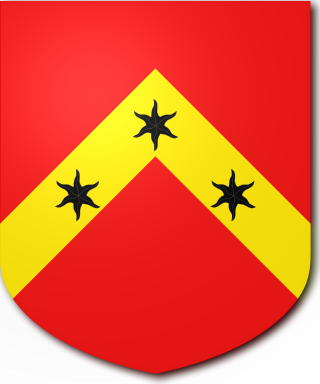Related Research Articles
Baron Killearn, of Killearn in the County of Stirling, is a title in the Peerage of the United Kingdom. It was created in 1943 for the diplomat Sir Miles Lampson. He was the second son of Norman Lampson, youngest son of Sir Curtis Lampson, 1st Baronet, of Rowfant. Lord Killearn's eldest son, the second Baron, succeeded his second cousin once removed as fourth Baronet in 1971. On his death the titles passed to his half-brother, the third and present holder of the barony and baronetcy.

Baron Burnham, of Hall Barn in the Parish of Beaconsfield in the County of Buckingham, is a title in the Peerage of the United Kingdom. It was created on 31 July 1903 for the influential newspaper magnate Sir Edward Levy-Lawson, 1st Baronet, owner of The Daily Telegraph. He had already been created a Baronet, of Hall Barn in The Parish of Beaconsfield in the County of Buckingham and of Peterborough Court in the City of London, in the Baronetage of the United Kingdom on 13 October 1892. Levy-Lawson was the son of Joseph Moses Levy, who acquired The Daily Telegraph only months after its founding.
Baron Bruntisfield, of Boroughmuir in the City of Edinburgh, is a title in the Peerage of the United Kingdom. It was created in 1942 for the Scottish Conservative politician and former Vice-Chamberlain of the Household, Sir Victor Warrender, 8th Baronet. The Warrender family descends from George Warrender. He was Lord Provost of Edinburgh and represented Edinburgh in Parliament. In 1715 he was created a baronet, of Lochend in the County of Haddington, in the Baronetage of Great Britain. His grandson, the third Baronet, fought at the Battle of Minden in 1759, represented Haddington Burghs in the House of Commons and served as King's Remembrancer of the Court of Exchequer from 1771 to 1791. He was succeeded by his son, the fourth Baronet. He sat as a Member of Parliament for Haddington Burghs, Truro, Sandwich, Westbury and Honiton and notably served as a Lord of the Admiralty from 1812 to 1812. In 1822 Warrender was admitted to the Privy Council. On his death the title passed to his younger brother, the fifth Baronet. His grandson, the seventh Baronet, was a Vice Admiral in the Royal Navy. He was succeeded by his son, the eighth Baronet, who was raised to the peerage as Baron Bruntisfield, of Boroughmuir in the City of Edinburgh, in 1942. As of 2010 the titles are held by the latter's grandson, the third Baron, who succeeded in 2007. He is a retired officer in the British Army and investment banker.

Viscount Leverhulme, of the Western Isles in the Counties of Inverness and Ross and Cromarty, was a title in the Peerage of the United Kingdom created in 1922 for the industrialist and philanthropist William Lever, 1st Baron Leverhulme. He had already been created a baronet, of Thornton Manor in the parish of Thornton Hough in the County of Chester, in the Baronetage of the United Kingdom in 1911, and Baron Leverhulme, of Bolton-le-Moors in the County Palatine of Lancaster, in 1917, also in the Peerage of the United Kingdom.

Baron Masham is a title that has been created three times, once in the Peerage of Great Britain and twice in the Peerage of the United Kingdom. It was first created in the Peerage of Great Britain in 1712 when the courtier Samuel Masham was made Baron Masham, of Otes. In 1723 he also succeeded as fourth Baronet of High Lever. The barony became extinct on the death of the second Baron in 1776. The Masham baronetcy, of High Lever in the County of Essex, was created by James I in the Baronetage of England on 20 December 1621 for Samuel Masham. The third Baronet was Member of Parliament for Essex. The baronetcy became extinct along with the barony in 1776.

The Wigan Baronetcy, of Clare Lawn in Mortlake in the County of Surrey and Purland Chase in Ross in the County of Hereford, is a title in the Baronetage of the United Kingdom. It was created on 9 March 1898 for Frederick Wigan, a Director of the North London Railway. The presumed 6th Baronet, listed in Debrett's Peerage (2015) as the son of the 5th Baronet, has not successfully proven his succession and is consequently not on the Official Roll of the Baronetage.
There have been nine baronetcies created for persons with the surname Lloyd, three in the Baronetage of England, three in the Baronetage of Great Britain and three in the Baronetage of the United Kingdom. Two of the creations are extant as of 2010.

Sir Arthur Levy Lever, 1st Baronet, known as Arthur Levy until 1896, was a British Liberal Party politician.
The Jenks baronetcy, of Cheape in the City of London, is a title in the baronetage of the United Kingdom. It was created on 8 October 1932 for Maurice Jenks, Lord Mayor of London from 1931 to 1932.
There have been two baronetcies created for members of the Baring family, one in the Baronetage of Great Britain and one in the Baronetage of the United Kingdom.
The Renshaw Baronetcy, of Coldharbour in Wivelsfield in the County of Sussex, is a title in the Baronetage of the United Kingdom. It was created on 7 January 1903 for Charles Renshaw, Unionist Party for Renfrewshire West from 1892 to 1906 and later Chairman of the Caledonian Railway Company. Sir David Renshaw, the fourth Baronet, is a member of the Executive Committee of the Standing Council of the Baronetage.
There have been four baronetcies created for persons with the surname FitzGerald, one in the Baronetage of Ireland and three in the Baronetage of the United Kingdom.

There have been three baronetcies created for persons with the surname Lever, all in the Baronetage of the United Kingdom.
The Miles Baronetcy, of Leigh Court in the County of Somerset, is a title in the Baronetage of the United Kingdom. It was created on 19 April 1859 for the banker and Conservative politician William Miles. His son, the second Baronet, was also a banker and Conservative politician. The family's bank, founded in 1750, eventually became part of NatWest.
There have been three baronetcies created for persons with the surname Denny, one in the Baronetage of England, one in the Baronetage of Ireland and one in the Baronetage of the United Kingdom. As of 2014 two of the creations are extant.

The O'Connell Baronetcy, of Lakeview in Killarney in the County of Kerry and of Ballybeggan in Tralee in the County of Kerry, is a title in the Baronetage of the United Kingdom. It was created on 29 October 1869 for James O'Connell. He was the youngest brother of the famous Irish politician Daniel O'Connell and the nephew of the soldier Lieutenant-General Daniel Charles, Count O'Connell.

The Carr Baronetcy, of Sleaford in the County of Lincolnshire, is a title in the Baronetage of England. It was created on 29 June 1611 for Edward Carr who was Sheriff of Lincolnshire in 1614. The 3rd Baronet was Chancellor of the Duchy of Lancaster and a Member of Parliament for Lincolnshire in the House of Commons.
There have been two baronetcies created for persons with the surname Piers, one in the Baronetage of Nova Scotia and one in the Baronetage of Ireland. One creation is extant as of 2008 while the other is dormant.
There have been three baronetcies created for personswith the surname Elphinstone, two in the Baronetage of Nova Scotia and one in the Baronetage of the United Kingdom. As of 2008 two of the creations are extant while one is dormant.

Sir Maurice Levy, 1st Baronet, JP, DL was a British Liberal Party politician.
References
- Kidd, Charles, Williamson, David (editors). Debrett's Peerage and Baronetage (1990 edition). New York: St Martin's Press, 1990.
- Leigh Rayment's list of baronets